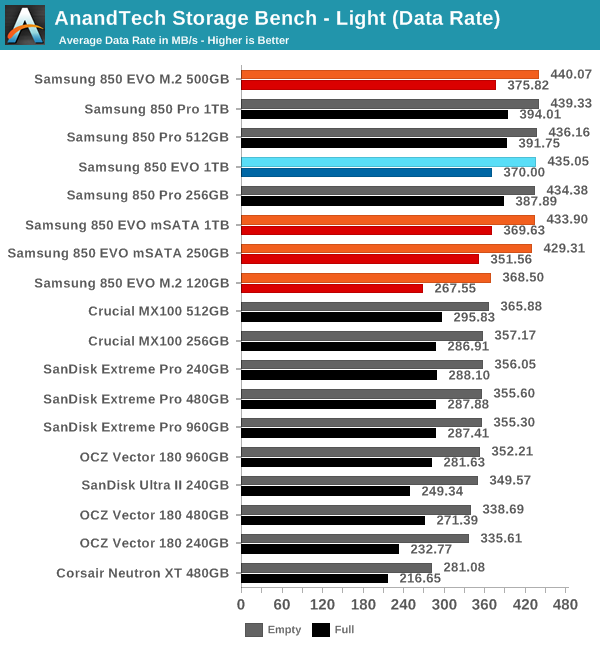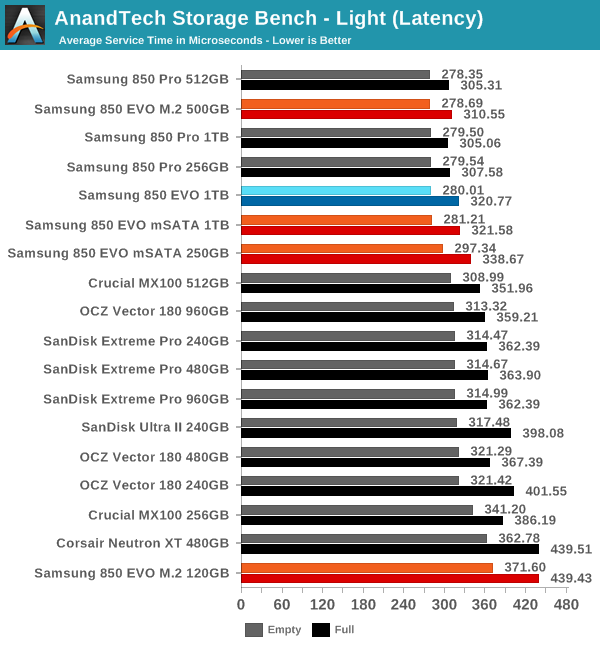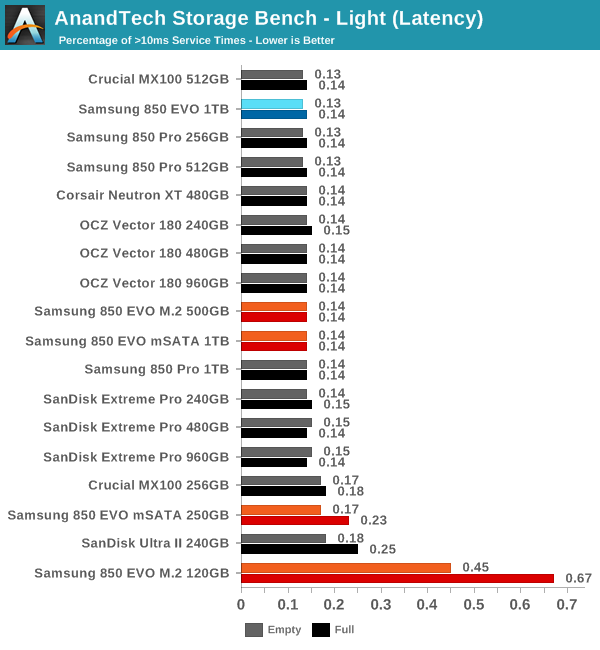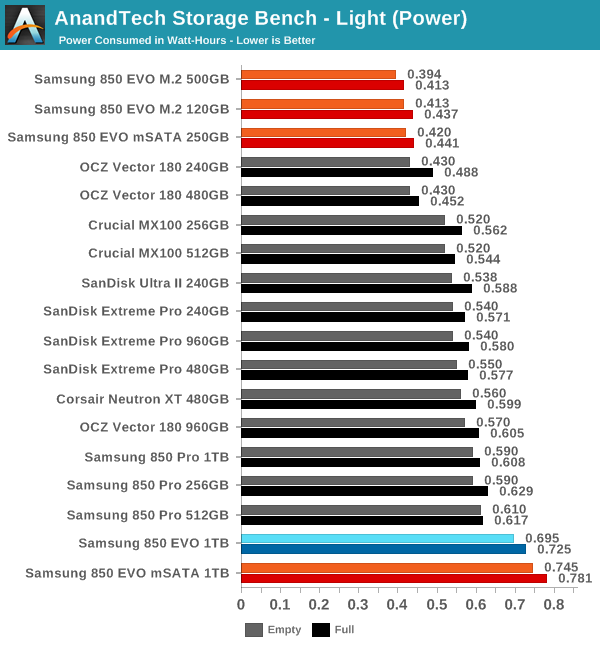The Samsung SSD 850 EVO mSATA/M.2 Review
by Kristian Vättö on March 31, 2015 10:00 AM ESTAnandTech Storage Bench - Light
The Light trace is designed to be an accurate illustration of basic usage. It's basically a subset of the Heavy trace, but we've left out some workloads to reduce the writes and make it more read intensive in general.
| AnandTech Storage Bench - Light - Specs | ||||||||||||
| Reads | 372,630 | |||||||||||
| Writes | 459,709 | |||||||||||
| Total IO Operations | 832,339 | |||||||||||
| Total GB Read | 17.97 GB | |||||||||||
| Total GB Written | 23.25 GB | |||||||||||
| Average Queue Depth | ~4.6 | |||||||||||
| Focus | Basic, light IO usage | |||||||||||
The Light trace still has more writes than reads, but a very light workload would be even more read-centric (think web browsing, document editing, etc). It has about 23GB of writes, which would account for roughly two or three days of average usage (i.e. 7-11GB per day).
| AnandTech Storage Bench - Light - IO Breakdown | |||||||||||
| IO Size | <4KB | 4KB | 8KB | 16KB | 32KB | 64KB | 128KB | ||||
| % of Total | 6.2% | 27.6% | 2.4% | 8.0% | 6.5% | 4.8% | 26.4% | ||||
The IO distribution of the Light trace is very similar to the Heavy trace with slightly more IOs being 128KB. About 70% of the IOs are sequential, though, so that is a major difference compared to the Heavy trace.
| AnandTech Storage Bench - Light - QD Breakdown | ||||||||||||
| Queue Depth | 1 | 2 | 3 | 4-5 | 6-10 | 11-20 | 21-32 | >32 | ||||
| % of Total | 73.4% | 16.8% | 2.6% | 2.3% | 3.1% | 1.5% | 0.2% | 0.2% | ||||
Over 90% of the IOs have a queue depth of one or two, which further proves the importance of low queue depth performance.

The 850 EVO also shines in our Light trace by being the fastest SATA drive we have tested along with the 850 Pro.

The latency is also great despite the capacity, so I have no problem recommending the 850 EVO for basic workloads -- it's only the heavier workloads that bring the smaller capacities to their knees.

Power is again excellent except for the 1TB model. I'm honestly a big surprised that the 850 EVO is so much more power efficient than the 850 Pro despite the fact that MLC NAND should be more power efficient by design.











58 Comments
View All Comments
Laststop311 - Wednesday, April 1, 2015 - link
Was really disappointed with the 1TB results. Also disappointed no ultra m2 interface. I wont be upgrading until I can get a pci-e 3.0 x4 interface on the drive. The samsung sm951 is where its at.Laststop311 - Wednesday, April 1, 2015 - link
Really annoying that I dont see this drive for sale anywhere and it's been talked about for a loooong timeKristian Vättö - Wednesday, April 1, 2015 - link
RamCity just got its first SM951 batch, so it's now available for purchase.https://www.ramcity.com.au/upgrade/data-storage/in...
bricko - Thursday, April 2, 2015 - link
Is the 951 NVMe - How to they compare to the new Intel 750 series which are PCIe gen 3 and NVMeseen here
http://linustechtips.com/main/topic/340041-intel-l...
http://forums.overclockers.co.uk/showthread.php?p=...
Intel are launching the new 750 Series range of SSD's these are PCI-E 3.0 versions with 4 lanes and are NVMe based SSD's
goodyes - Wednesday, April 1, 2015 - link
Ya, but results that I have a 1TB 840 msata and write sequential at more than 500MBps around 520max MBps, and now I see than new 850 msata tops at ?? 480MBps ?? cannot be possible what my eyes look, AND WHY THE HELL NO ONE REVIEWER COMPARE With olders 840 msata, so I must think that all of you guys are a paid reviewers and you get money from samsung, if not, YOU MUST compare to older modelKenPC - Wednesday, April 1, 2015 - link
I am seriously concerned that the 840 evo, and TLC in general may indeed have an uncurable problem with slowdown after a period of time. This same problem has also been reported in multiple instances for Samsung OEM drives based on the 840 evo TLC technology.GIven that the 850 evo msata line was delayed by Samsung by about a month, it might be possible that the Anandtech review units were actually tested in late Feb and the go-ahead to publish the results only recently provided.
I did also notice that the estimated 'March" timeframe for a new 840 evo firmware has come and passed, as well as no drive magician support for the 850 evo m2/msata drives yet.
Anandtech results for the 1TB 850 evo unit are also quite concerning.
So, I also join the crowd asking for a look at the 850 evo 2.5 and msata drives after some time has passed to see if they suffer from the slowdown problem too.
And a rhetorical, but serious question - does anybody actually have a Samsung TLC drive that has NOT suffered from the slowdown as measured by the proper tools a few months after the drive was formatted/set up?
And kudos to Anandtech - for an SSD review that really tests the drives, not just a run of ATTO or such.
Per Hansson - Wednesday, April 1, 2015 - link
"anything that taxes the drive a bit more may run into the issue, which is basically that the drive stops for up to dozens of seconds (i.e. your system freezes). Until Samsung fixes that, I would advise against buying the 1TB version unless you have a very light workload (web browsing, email, etc.). I suspect it's fixable through a firmware update, but I'll have to wait for Samsung's reply to be sure of that."A wise man once said: if you wait for a firmware fix for your Samsung SSD's you will wait a long time.
He died of old age.
RIP Samsung 840 TLC drives.
Dzungpv - Friday, April 3, 2015 - link
Missing Temperature when idle, full load or stretch, i want this information before buy them .szhosain - Sunday, April 5, 2015 - link
As far as I can tell, you only tested the M.2 version of the Samsung 850 EVO in a 500GB size.Can we assume that the MSATA version of that drive and size will perform essentially identically?
voicequal - Monday, April 13, 2015 - link
Good catch on the poor mSATA 1TB performance during the performance consistency test. It harkens back to the early Jmicron stuttering days. I was similarly affected by the SanDisk U100 a few years ago. The system freezes, particularly when swap file is active, and disk throughput drops to low single digit MB/s. Hard to believe the most modern SSDs can still get into this state. Vanilla benchmarks don't show the problem.